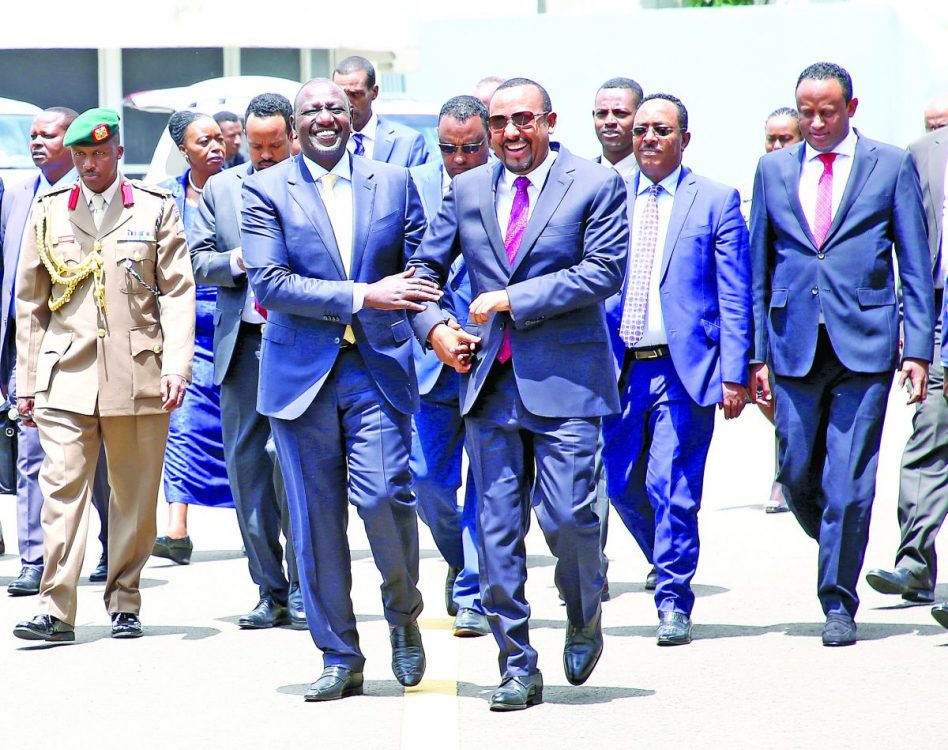Safaricom breaks ground in Ethiopia
By Noel.Wandera, October 7, 2022Kenya’s biggest telco, Safaricom, yesterday broke a new frontier by launching Safaricom Telecommunications Ethiopia (STE) to offer services in the populous nation of 120 million in a fete witnessed by President William Ruto.
The Ethiopian expansion is expected to provide revenue stream options for the giant telco, and also act as a springboard for more products, and send signals for other Kenyan companies to mull Ethiopian venture.
President William Ruto’s presence proved the underlying importance of the firm’s regional expansion strategy, terming the deal an “excellent tradition of neighbourly synergy shall continue and flourish”.
Safaricom Ethiopia’s network and services had earlier been rolled out in the capital city Addis Ababa, following pilots in 10 cities. The subsidiary plans to launch services in a total of 25 cities by 2023, to meet the 25 per cent population coverage obligation in its license.
Peter Ndegwa, CEO of Safaricom Plc said the firm has deepened digital and financial inclusion in Kenya by connecting people to people, people to opportunities and people to information.
“With these lessons and experiences, we look forward to positively impacting the people of Ethiopia with a sustainable and quality mobile network that will be a vital launch pad for nationwide digital telecommunications services to over 118 million Ethiopians,” he added.
The launch date was pushed forward to April this year due to the Covid-19 pandemic and what management referred to as logistical challenges.
State-owned Ethio-Telecom had for a long time been a monopoly in Africa’s most populous country but the Ethiopian government announced plans to partially privatise Ethio-Telecom after Prime Minister Abiy Ahmed took power in 2018.
Abiy’s efforts to open up the economy have, however, been blighted by a nearly two-year war in the Northern region of Tigray that has killed thousands of people and uprooted a million others.
Safaricom leads a consortium, as the major shareholder in the Ethiopian venture with a 55.7 per cent stake, which it co-owns with UK’s Vodafone, South Africa’s Vodacom, Sumitomo Corporation and British International Investment.
Ethiopians will, however, have to wait longer for the telco’s flagship M-Pesa product, which will be delayed as the Ethiopian government sorts out the legal framework. In the meantime, Ndegwa said, they are having informal discussions with the Ethiopian government about the ability of the consortium to operate mobile money, even as the company readies itself to roll out the product.
“Previously, the legal framework did not allow foreign-operated entities to operate for mobile money. We are however grateful that the government has made significant efforts to ensure this is addressed and it is close to conclusion,” said Ndegwa.
He revealed that the Bank of Ethiopia has visited Kenya and Tanzania to see how M-Pesa operates. “We are starting to make plans that are necessary so that when we get the license, we can be able to shorten the period that it will take for us to eventually launch mobile money,” he said.
With the launch, shareholders will be hoping for a rebound in Safaricom’s shares price, which has been losing ground due to what Wesley Manambo, a market analyst with Genghis Capital attributed to a “myriad of factors” including “the war in Ethiopia, crisis in Eastern Europe, the election risk and energy crisis that has impacted their client’s propensity to consume.”
The telco’s share closed yesterday trading at Sh23.65 after dropping from the Sh24.75 it traded on Monday.
More Articles

